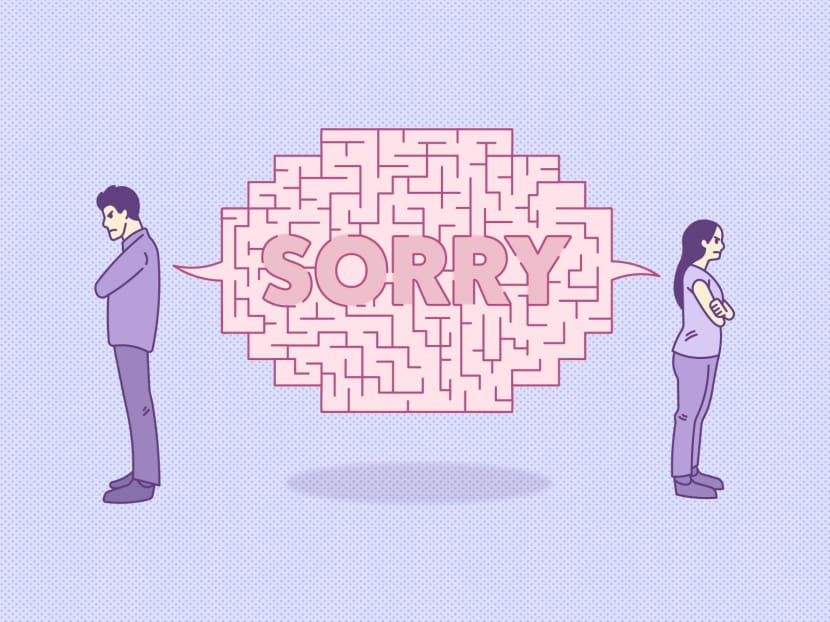Why 'sorry' seems to be the hardest word for some of us
Contrary to popular belief, the person who is first to apologise is not necessarily the one who is at fault. The act of apologising is more about bridging the gap between our intentions and how others are affected, counsellors said.

For some people, apologising may sometimes feel like “admitting failure”, which can trigger fears of rejection or judgment, mental health experts said. (Illustration: CNA/Nurjannah Suhaimi)

This audio is generated by an AI tool.
It was New Year’s Eve two years ago when a minor incident escalated into an unexpected conflict between me and my sister.
I opened a cabinet, unaware that her limited-edition tumbler was precariously placed inside. It bounced off the table, tumbled out of the kitchen window, fell 18 floors from our housing block and shattered on the ground floor.
I hadn’t intentionally thrown it out the window but my sister was furious. Her anger felt disproportionate and unlike other times when I might have instinctively apologised, this time, I defiantly held my ground refusing to say "sorry" for an unintentional act.
In hindsight, a simple and genuine apology might have resolved the situation.
Instead, we went through three days of "cold war" at home before I approached my sister and expressed regret at the situation.
Since it was an accident and the situation wasn’t entirely my fault, wasn’t I justified in standing my ground? Would an apology suggest that I was taking all the blame?
It turns out that apologising involves more than just taking on the blame and it is about addressing the uncomfortable gap between what we intended to happen and the consequences of our actions.
Clinical psychologist Annabelle Chow from private practice Annabelle Psychology explained: “Apologising isn’t solely about assigning blame – it’s about acknowledging and addressing the emotional impact of your actions.
“Even if the harm was unintentional, offering an apology shows empathy and care that helps the hurt party feel recognised and valued.”
Apologies and apologising are crucial in any relationship, but why do so many people struggle with them? Also, does saying "sorry" suffice?
APOLOGISING NOT ALWAYS ABOUT ADMITTING FAILURE
Experts told CNA TODAY that apologising can sometimes be challenging because it requires “vulnerability” from the person dishing out the apology.
Additionally, many people have learnt to interpret apologies as confessions of wrongdoings.
Ms Theresa Pong, founder and counselling director of The Relationship Room, which provides counselling and coaching services, said: “Admitting that one has done a wrong often stirs feelings of guilt and shame, which can be uncomfortable and overwhelming.”
She noted that apologising sometimes feels like “admitting failure”, which can trigger fears of rejection or judgment.
Agreeing, Dr Chow said: “(Apologising) requires self-admission to take responsibility for wrongdoings and put ourselves ‘at the mercy’ of the person to whom we’re apologising.”
She observed how some people worry that an apology might escalate the situation and lead to further accusations, vengeance or negative repercussions.
“This fear heightens a reluctance to apologise or try and cover up the mistake.”
Furthermore, apologising might feel like a blow to some people’s pride, reputation and confidence, which can make them feel weak or inadequate, Dr Chow added.
“For them, it can feel like the self-image they uphold will be shattered if they admit they are wrong. This is particularly difficult for people who equate mistakes with weakness, failure or incompetence.”
Ms Liew Shi Min, director and clinical psychologist of Heartscape Psychology Clinic, said that apologising could be difficult for some people because it can “trigger our core schemas”.
Schemas are mental frameworks that shape how we perceive, interpret and respond to experiences based on our past knowledge, beliefs and emotions.
For a person with negative schemas, such as the fear of inadequacy or rejection, apologising might lead to negative thought patterns such as “I will be looked down upon if I apologise", Ms Liew added.
“Even if some of us are objectively aware that we’ve done something wrong, our subjective thoughts and emotions could take control of our resulting behaviours, since we find more comfort in relying on our habitual patterns."
This is particularly true for people with unresolved attachment issues or insecure attachments, because offering apologies may feel overly vulnerable, threatening or even like an attack, she said.
Besides personal struggles, the mental health experts said that culture plays an important role in how apologies are expressed and understood.
In some cultures, especially Asian cultures, hierarchy and respect for elders play a significant role, where apologising is associated with weakness, shame or a loss of status.
“It is often uncommon for elders to apologise to juniors, because this might be seen as a challenge to their authority,” Ms Pong said.
“Instead, they may choose indirect ways to express remorse, such as offering help or a gift.”
HOW TO SAY SORRY
Apologies are essential to maintaining good relations, but it is better not to be too hasty with an apology, the experts said.
A quick apology to ease the situation without acknowledging the pain may seem insincere or dismissive. This is especially crucial in situations where the harm caused was unintentional.
"Apologising can be counterproductive if we are too quick to apologise before understanding the situation and listening to the other person," Ms Liew said.
After considering the other person's point of view, remember that the intent of the apology is just as important as the apology itself.
"An effective apology is more than just saying 'sorry'. It's about showing genuine effort to repair the harm and rebuild trust," Dr Chow said.
She added that an effective apology fosters understanding and healing, while a poorly delivered one may leave the other person feeling invalidated or angrier.
And a genuine apology should include not just remorse but also a clear commitment to change, if that is applicable to the situation.
"Start by naming the hurt caused, showing genuine remorse and expressing a willingness to make things right," Ms Pong said, adding that framing an apology with empathy is crucial for healing.
For example, instead of saying, "I'm sorry", try instead to say, "I understand how my actions hurt you and truly regret that".
When apologising, it would be helpful to avoid statements with "but" and "you", because "but" may imply a lack of responsibility for the situation and "you" could imply a personal attack on the other person, Ms Liew said.
For those who find speaking face-to-face too intimidating, writing a thoughtful text message or note can be just as effective.
"What matters most is your effort to validate the other person's feelings and demonstrate your commitment to repairing trust, even if you can't say the words 'I'm sorry' right away," Dr Chow said.
DON'T OVERDO IT
There are people who would benefit from reflecting on why apologising is difficult for them, Ms Liew said.
Doing such self-reflection can help them become more aware of triggers and unhelpful patterns.
"Being self-aware is the first step to minimising rash and automatic responses that may hurt us and the other person," she added.
In some instances, there is also the risk of getting used to apologising without understanding one's intent and then falling into the habit of over-apologising.
Dr Chow said over-apologising dilutes the sincerity of one's words and may come across as not genuine or overly self-critical.
"Instead of criticising yourself entirely, focus on the specific behaviour."
For example, say, "I'm sorry I missed our meeting", rather than "I'm sorry I'm so bad at everything".
Apologising doesn't mean agreeing to things that make us uncomfortable or appeasing others by sacrificing our boundaries, Dr Chow added.
"Instead, we can acknowledge and apologise for the disappointment or unhappiness that arise due to our boundaries, but we should not apologise for, give in or forsake our boundaries."
Over-apologising could lead to unhealthy relationship dynamics where "taking on blame" is the go-to approach to discomforting situations, Ms Liew cautioned.
"It may also reflect our people-pleasing behaviours, because we may think that apologising could quickly stop the conflicts."













